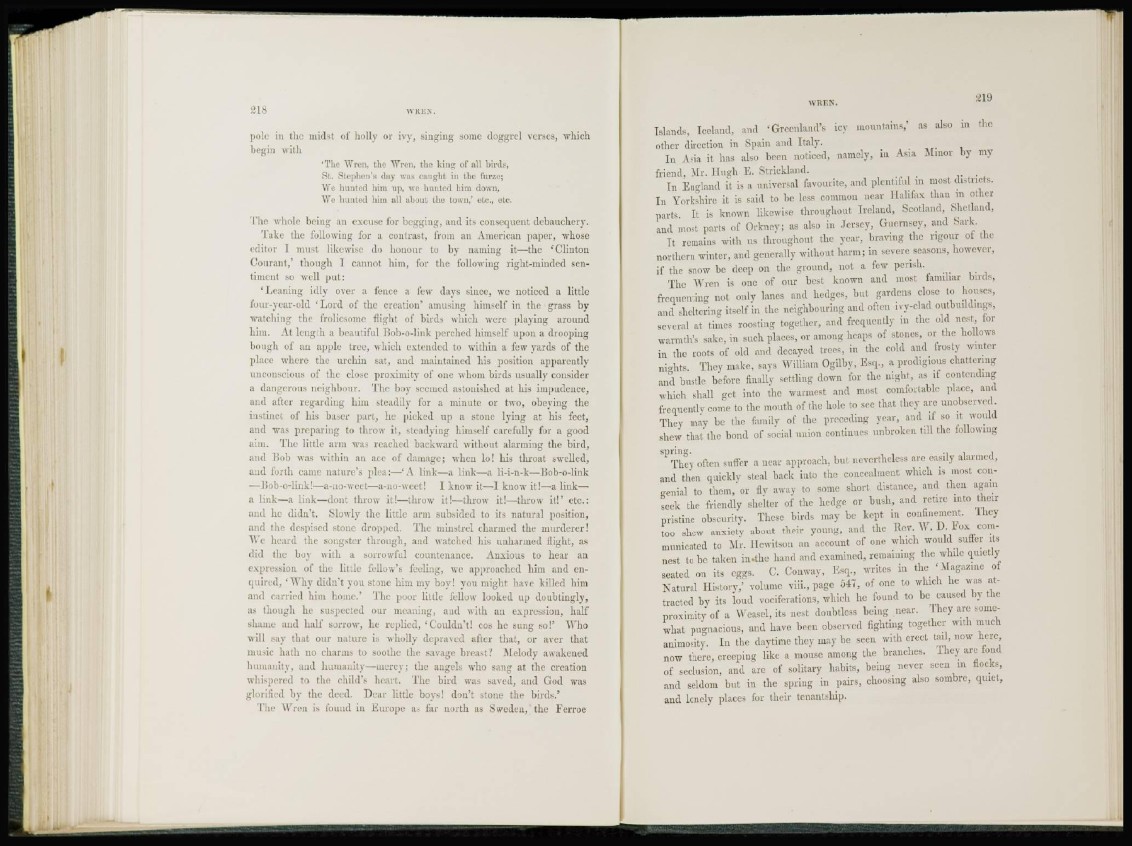
pole in the midst of holly or ivy, singing some doggrel verses, which,
begin with
'The "Wren, the Wren, the king of all birds,
St. Stephen's day was caught in the furze;
We hunted him up, we hunted him down,
We hunted him all about the town,' etc., etc.
The whole being an excuse for begging, and its consequent debauchery.
'1 ake the following for a contrast, from an American paper, whose
editor 1 must likewise do honour to by naming it—the 'Clinton
Courant,' tiro ugh 1 cannot him, for the following right-minded sentiment
so well put:
'Leaning idly over a fence a few days since, we noticed a little
four-year-old ' L o r d of the creation' amusing himself in the grass by
watching the frolicsome flight of birds which were playing around
him. At length a beautiful Bob-o-link perched himself upon a drooping
bough of an apple tree, which extended to within a few yards of the
place where the urchin sat, and maintained his position apparently
unconscious of the close proximity of one whom birds usually consider
a dangerous neighbour. The boy seemed astonished at his impudence,
and after regarding him steadily for a minute or two, obeying the
instinct of his baser part, he picked up a stone lying at his feet,
and wa> preparing to throw it, steadying himself carefully for a good
aim. The little arm was reached backward without alarming the bird,
and Bob was within au ace of damage; when lo! his throat swelled,
and forth came nature's plea:—'A link—a link—a li-i-n-k—Bob-o-link
—Bob-o-link!—a-no-weet—a-no-wcet! I know it—I know it!—a link—
a link—a link—dont throw it!—throw it!—throw it!—throw it!' etc.:
and he didn't. Slowly the little arm subsided to its natural position,
and the despised stone dropped. The minstrel charmed the murderer!
\ \ c heard the songster through, and watched his unharmed flight, as
did the boy with a sorrowful countenance. Anxious to hear an
expression of the little fellow's feeling, we approached him and enquired,
' W h y didn't you stone him my boy! you might have killed him
and carried him home.' The poor little fellow looked up doubtingly,
as though he suspected our meaning, and with an expression, half
shame and half sorrow, he replied, 'Couldn't! cos he sung so!' Who
will say that our nature is wholly depraved after that, or aver that
music hath no charms to soothe the savage breast? Melody awakened
humanity, and humanity—mercy; the angels who sang at the creation
whispered to the child's heart. The bird was saved, and God was
glorified by the deed. Dear little boys! don't stone the birds.'
The Wren is found in Europe a- far north as Sweden, the Ferroe
Islands, Iceland, and 'Greenland's icy mountains,' as also in the
other direction in Spain and Italy.
I n Asia it has also been noticed, namely, in Asia Minor by my
friend, Mr. Hugh E. Strickland.
I n England it is a universal favourite, and plentiful in most districts.
I n Yorkshire it is said to be less common near Halifax than in other
parts. It is known likewise throughout Ireland, Scotland, Shetland,
and most parts of Orkney; as also in Jersey, Guernsey, and Sark.
I t remains with us throughout the year, braving the rigour of the
northern winter, and generally without harm; in severe seasons, however,
if the snow be deep on the ground, not a few perish.
The Wren is one of our best known and most familiar birds,
frequenting not only lanes and hedges, but gardens close to houses,
and sheltering itself in the neighbouring and often ivy-clad outbuildings,
several at times roosting together, and frequently in the old nest, for
warmth's sake, in such places, or among heaps of stones, or the hollows
in the roots of old and decayed trees, in the cold and frosty winter
nights. They make, says William Ogilby, Esq., a prodigious chattering
and bustle before finally settling down for the night, as if contending
which shall get into the warmest and most comfortable place, and
frequently come to the mouth of the hole to see that they are unobserved.
They may be the family of the preceding year, and if so it would
shew that the bond of social union continues unbroken till the following
spring.
They often suffer a near approach, but nevertheless are easily alarmed,
and then quickly steal back into the concealment which is most congenial
to them, or fly away to some short distance, and then again
seek the friendly shelter of the hedge or bush, and retire into their
pristine obscurity. These birds may be kept in confinement. They
too shew anxiety about their young, and the Rev. W. D. Fox communicated
to Mr. Hewitsou an account of <me which would suffer its
nest to be taken inathe hand and examined, remaining the while quietly
seated on its eggs. C. Conway, Esq., writes in the ' Magazine of
Natural History,' volume viii., page 547, of one to which he was attracted
by its loud vociferations, which he found to be caused by the
proximity of a Weasel, its nest doubtless being near. They are somewhat
pugnacious, and have been observed fighting together with much
animosity. In the daytime they may be seen with erect tail, now here,
now there, creeping like a mouse among the branches. They are fond
of seclusion, and are of solitary habits, being never seen in flocks,
and seldom but in the spring in pairs, choosing also sombre, quiet,
and lonely places for their tenantship.